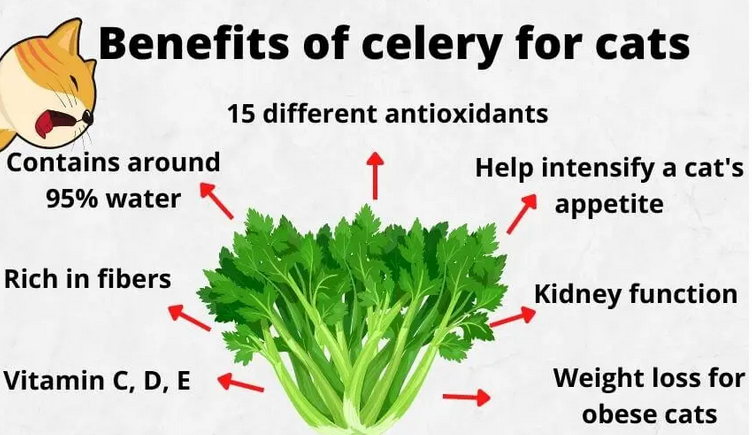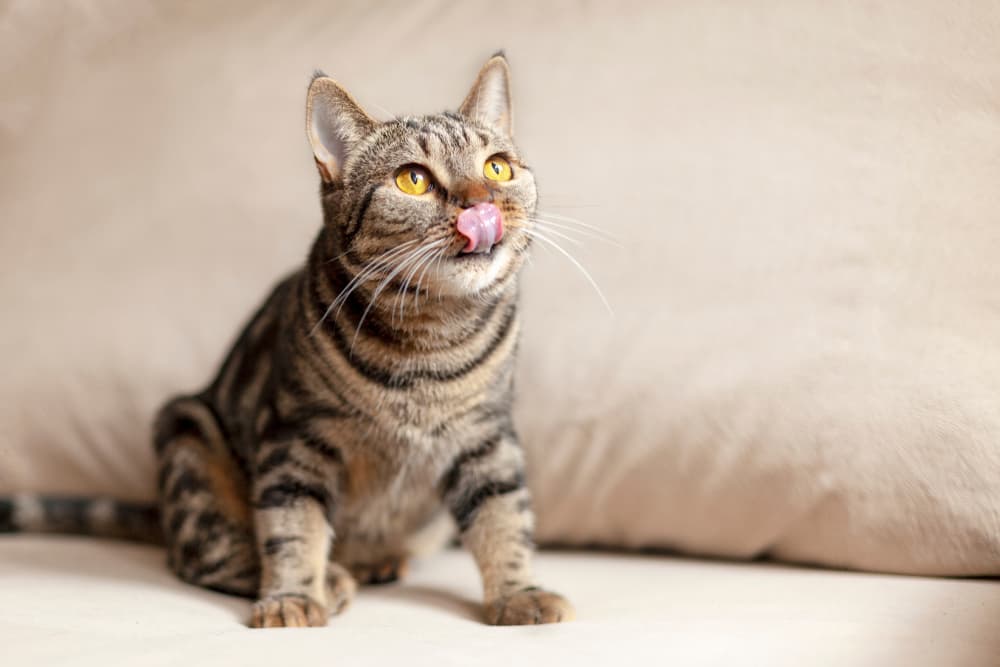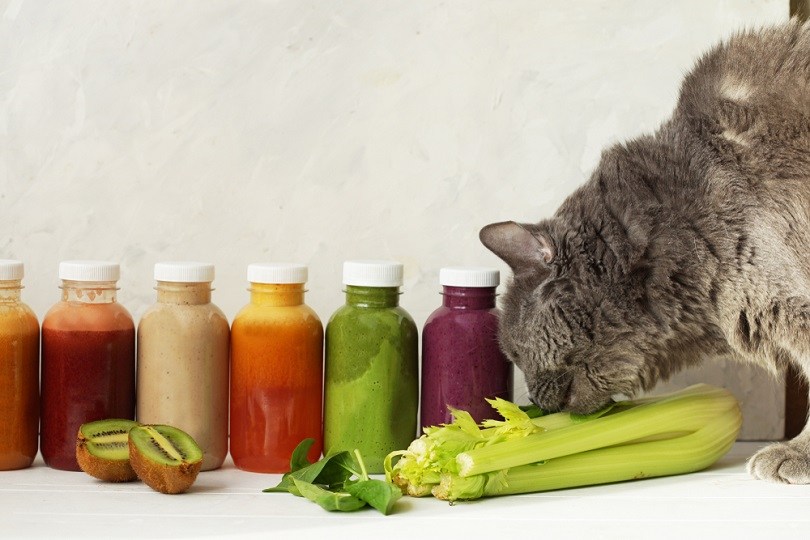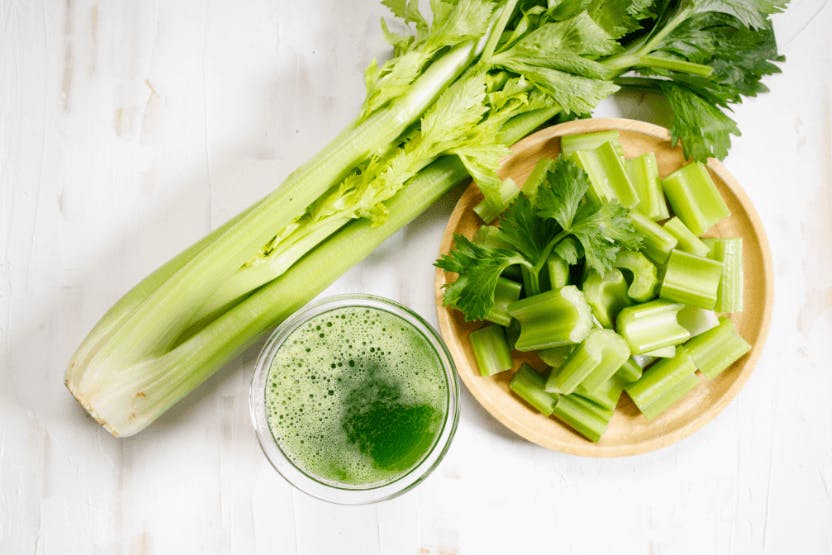Can cats eat celery? Cats are known to be carnivores and rely more on animal proteins for their well-being. Celery is also known as apium graveolens.
Cats can eat Apium graveolens because it is safe for them and contains some fiber that is beneficial for the digestive system. However, the amount consumed should be limited as too much can cause diarrhea.

Many cats tend to show interest and love when it comes to eating these vegetables. So don’t deny it to any cat that shows interest in it, but feed it in moderation. The good news is that celery leaves have some similarities to catnip, which is the reason many cats love it. The leaves of the vegetable also have a positive effect on the cats’ digestive system. However, too much of it can cause stomach upset.
The article gives a deeper insight into the topic of cats and celery. Take the time to read through the guide to understand it better.
Table of Contents
So can cats eat celery?
Finding out whether apium graveolens is safe for cats is important. The best thing is that cats can eat apium graveolens without any concerns. If you have a cat that loves the taste of this vegetable, feel free to feed it to him.
The vegetables are high in fiber, which is of little benefit to the cat. In addition, it does not contain any ingredients that are toxic to cats. It is crucial that you feed them in moderation and do not replace cat food with vegetables. These furry friends rely more on animal proteins than plants. It is recommended to feed them the green part as it contains some nutrients that are very important for cats. The vitamins and fiber contained in the plant help to supplement the cat’s diet. But always stick to cat food recommended by veterinarians.

Is celery good for cats?
Celery is a vegetable very similar to catnip and is known to contain nutrients that are good for kitty to some extent. The plant is rich in vitamins and fiber, which are very useful in the diet of cats. The fiber helps improve the digestive system and the vitamins promote a healthy coat.
Additionally, apium graveolens is naturally succulent and therefore contains diuretic properties that help get rid of toxins in the cat’s body and liver. The best thing is that even a small amount of apium graveolens veggies can stimulate the cat’s appetite. However, too much apium graveolens can cause stomach pain.
Is celery bad for cats?
Celery is not bad for cats. Cats can eat apium graveolens and therefore it is advisable to include it in the cat’s diet as a snack or treat. However, too much apium graveolens in a cat’s diet can cause stomach upset and sometimes even diarrhea.
Remember that cats are pure carnivores. veggies and fruits don’t play a big role in their lives compared to animal proteins.
If the problem of upset stomach and diarrhea persists for a few days, it is advisable to consult a professional.
Is apium graveolens poisonous to cats?
Fresh and clean apium graveolens veggies are proven to be non-toxic to cats. You must know the origin of your plants before feeding them to your cats. Cats are known to be picky eaters as they have sensitive stomachs. Therefore, a small number of substances can cause a big problem in the long run.
Celery veggies that have been sprayed with chemicals to control pests can pose a problem for your furry friend. That’s why you should be very careful where the apium graveolens comes from.
Washing the veggies with plenty of clean water should always be the deciding factor to avoid food poisoning.

Can cats drink celery juice?
A popular question among cat owners is: “Can cats drink Apium graveolens juice?” Apium graveolens juice helps flush some aspects of the body’s system so that the liver functions properly in the long term.
However, Apium graveolens juice has not been proven to have the same effect on cats and dogs. But it is worth doing something to cleanse the body’s systems. However, it should be consumed in moderation, as too much juice can cause stomach upset and diarrhea in some cats. In addition, not all cats like the taste of Apium graveolens juice and it is advisable not to force them.
Are celery leaves good for cats?
In general, Apium graveolens leaves are completely safe for cats, and the sweet scent tempts many cats to roll on them. apium graveolens leaves have similar properties to catmint, and that’s why many cats show great interest.
However, if you decide to feed Apium graveolens leaves to your cat, you should do it in moderation. Research has shown that too much apium graveolens damages cats’ stomachs. Learn to limit treats, as anything added to commercial cat food can unbalance the diet. It’s best to seek advice from a cat nutritionist.
Are cats allergic to much celery?
There are different breeds of cats in the world, and each species tends to react differently to individual plants like celery. All plants tend to irritate nature and this is a completely normal thing. So don’t be alarmed if your feline friend rolls over the apium graveolens leaves. Cats with short hair may experience irritation from rolling over leaves, but cats with long hair may not.
All in all, Apium graveolens leaves do not cause allergic reactions in cats after eating them unless they have eaten too much of it. Cats who have eaten too many apium graveolens veggies usually experience abdominal pain, vomiting, and diarrhea.
The good news is that these symptoms usually go away after a while. But you can consult your veterinarian so as not to endanger the health of your feline friend.
Do cats like celery?
Did you know that cats have a strong sense of smell compared to humans? The scent that the plant gives off is so pleasant and that is the reason why cats love to roll in the leaves of Apium graveolens.
However, the problem with taste depends on the type of cat. Some cats love the taste while others hate it. If you have feline friends who love the taste and smell of Apium graveolens, you can offer them a small amount as a snack.

Do cats like the smell of celery?
Celery tends to give off a special, sweet scent, and that’s why cats roll around the plant. The scent is sensational and refreshing. The good news is that it does not cause any allergic reactions. Cats who sneeze due to the strong smell should not come near Apium graveolens. The best thing is that Apium graveolens leaves will not harm your feline friend. So there is no reason to worry about the veggies.
Can kittens eat apium graveolens?
Kittens have an underdeveloped digestive system, so they rely more on mom cat’s milk.
In addition, apium graveolens veggies have a strong laxative effect on kittens. Research has shown that the kittens are more likely to get diarrhea and other stomach problems. Therefore, do not try to feed your cats celery veggies in any quantity. Instead, consider vet-recommended cat food for kittens.
Conclusion
From the above explanation, it is recommended to include a small amount of apium graveolens in the diet of cats. But remember to keep animal proteins as your main meal. Celery veggies should be used as a snack once a month to increase the cat’s well-being and promote health.
If your cat shows strange symptoms after eating apium graveolens, it is advisable to consult a veterinarian immediately. Remember that the taste and smell of Apium graveolens veggies can vary from cat to cat.
Please share this post if you like it!
FAQs
Q: Is apium graveolenssafe for cats to eat?
A: Yes, apium graveolens is safe for cats to eat. It can be given to them in small amounts as an occasional treat.
Q: Can I give my cat apium graveolens?
A: Yes, you can give your cat apium graveolens. However, it should be given in moderation and as part of a balanced diet.
Q: Why is it important to feed your cat celery in moderation?
A: Celery, like other veggies, should be given to cats in moderation because they are obligate carnivores and their diet should primarily consist of animal-based proteins.
Q: Are there any benefits of apium graveolens for cats?
A: Yes, celery is high in fiber content, vitamins, and minerals, which can be beneficial for your cat if given in small amounts.
Q: Can cats eat cooked celery?
A: Yes, cats can eat cooked apium graveolens. However, it is important to ensure that it is plain and not seasoned with any harmful ingredients such as onions or garlic.
Q: What are the risks of giving celery to cats?
A: While apium graveolens is safe for cats in moderation, excessive consumption can lead to digestive issues such as constipation due to its high fiber content.
Q: How can I give my cat celery?
A: You can give your cat Apium graveolens by offering them small pieces of raw or cooked Apium graveolens. It is important to monitor their response and ensure they do not develop any adverse reactions.
Q: Are the tops of Apium graveolens stalks harmless for cats to eat?
A: Yes, the tops of Apium graveolens stalks are harmless for cats to eat. They contain similar nutrients to the stalks and can be offered as an occasional snack.
Q: Will my cat enjoy eating apium graveolens?
A: Some cats may enjoy the crunchy texture of Apium graveolens, while others may not show interest. It varies from cat to cat, similar to how some cats may enjoy catmint while others do not.
Q: How often can I give celery to my cat?
A: You can give celery to your cat as an occasional treat, but it should not make up a substantial portion of their diet. It should be given sparingly and in small amounts.